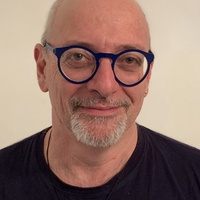
BSc (Hebrew University), PhD (University of Rochester)
Chair in Mathematical Sciences
- About
-
- Email Address
- r.levi@abdn.ac.uk
- Telephone Number
- +44 (0)1224 272753
- Office Address
Fraser Noble 138
- School/Department
- School of Natural and Computing Sciences
Qualifications
- BSc Mathematics1988 - Hebrew University, Jerusalem, Israel
- PhD Mathematics1993 - University of Rochester
Internal Memberships
Mathematics Post Graduate Coordinator
- Research
-
Research Overview
Algebraic Topology, Homotopy Theory of classifying spaces of finite groups, Applications of topology and geometry to science and particularly neuroscience, Classical Homotopy Theory, Representation Theory of finite groups and interactions with homotopy theory
Current Research
Combinatorial Topology. Combinatorial constructions have played a major role in algebraic since the beginning of the subject. With the growing interest in real world applications of algebraic topology, there is an ever growing interest in the interaction between combinatorics and topology. I am spefically interested in constructions such as polyhedral products, configuration spaces, complexes of injective words and stochastic topology.
Neuoro-topology: The geometry and topology of neural systems. Mathematics has played a central role in neuroscience since its inception. More recently, particularly with the emergence of extremely powerful computational models of the brain (for instance the EPFL's Blue Brain Project), new mathematical approaches to neuroscience are emerging, which are analogous to the highly productive feedback loop between topology and physics. The methods of algebraic and geometric topology are perfectly suited for modelling, analysing, and predicting structures that arise in neuroscience, which in turn inspire new directions for research within topology. Indeed, topology is already both providing significant insight in current research and contributing to shaping future research in neuroscience. Moreover it is probable that major questions of neuroscience could inspire the creation of new and exciting topological concepts that could then provide powerful new tools for neuroscience.
In a collaboration with the Blue Brain Project, we address the following challenges:
- Describe possible approaches for applying topology to neuroscience, both conceptually and computationally.
- Explore new ways of applying topological and computational techniques to the identification, analysis and development of modelled neural structures.
- Build a theoretical framework for neuroscience that is based on the topology, geometry and category theory that naturally emerge when studying neural systems.
- Explain mechanisms by which major questions of neuroscience could inspire the creation of new and exciting topological concepts that, in turn, could provide powerful tools for neuroscience.
Aberdeen Neuro-Topology Research Group
p-Local Groups. These are algebraic objects modelled on the homotopy theory associated to p-completed classifying spaces of finite groups. They enable one to relate the p-local structure of a finite group to related aspects of the homotopy theory of the resulting p-completed classifying space. The concept also allows for the construction of exotic homotopy types, i.e., spaces which behave from a homotopy theoretic point of view like a p-completed classifying space of a finite group, but in fact are not such spaces. The theory extends to the concept of p-local compact groups which is modelled on the p-local homotopy theory of classifying spaces of compact Lie groups and p-compact groups.
Collaborations
- p-Local Groups and the homotopy theory of classifying spaces: Carles Broto (Barcelona), Bob Oliver (Paris 13), Natalia Castellana (Barcelona), Jesper Grodal (Kopenhagen) Dietrich Notbohm (Leicester), Assaf Libman (Aberdeen), Alex Gonzalez (Barcelona), Emannuel Farjoun (Hebrew University, Jerusalem)
- Neurotopology: Kathryn Hess (EPFL), Henry Markram (Blue Brain Project, EPFL), Dejan Govc (RF, Aberdeen), Janis Lazovskis (RF, Aberdeen), Henri Riihimaki (RF, Aberdeen), Jason Smith (RF, Aberdeen)
- Classical Homotopy Theory: Fred Cohen (Rochester), Kathryn Hess (EPFL)
Funding and Grants
EPSRC, Topological Analysis of Neural Systems EP/P025072/1
Ecole Polytechnique Federale de Lausanne (Collaboration agreement Blue Brain Project)
- Publications
-
Page 1 of 4 Results 1 to 10 of 37
Realizability of fusion systems by discrete groups
Working Papers: Preprint PapersDetection of haematoma and peri-haematomal regions of intracerebral haemorrhage using lowfield field-cycling imaging – preliminary study results
8th World Intracranial Hemorrhage Conference (WICH 2023), OP-10Contributions to Journals: Abstracts- [ONLINE] DOI: https://doi.org/10.1159/000534450
Polyhedral products over finite posets
Kyoto Journal of Mathematics, vol. 62, no. 3, pp. 615-654Contributions to Journals: Articles- [ONLINE] DOI: https://doi.org/10.1215/21562261-2022-0020
- [ONLINE] View publication in Scopus
An application of neighbourhoods in digraphs to the classification of binary dynamics
Network Neuroscience, vol. 6, no. 2, pp. 528-551Contributions to Journals: Articles- [ONLINE] DOI: https://doi.org/10.1162/netn_a_00228
- [OPEN ACCESS] http://aura.abdn.ac.uk/bitstream/2164/19015/1/Conceicao_etal_NNS_An_Application_of_VOR.pdf
- [ONLINE] View publication in Scopus
- [ONLINE] View publication in Mendeley
Topology of synaptic connectivity constrains neuronal stimulus representation, predicting two complementary coding strategies
PloS ONE, vol. 17, no. 1, e0261702Contributions to Journals: ArticlesLoop space homology of a small category
Working Papers: Working Papers- [ONLINE] https://arxiv.org/abs/1807.02353v3
Complexes of Tournaments, Directionality Filtrations and Persistent Homology
Journal of applied and computational topology, vol. 5, pp. 313-337Contributions to Journals: ArticlesLoop space homology of a small category
Annals of K-Theory, vol. 6, no. 3, pp. 425-480Contributions to Journals: ArticlesCharacterisation of polyhedral products with finite generalised Postnikov decomposition
Forum Mathematicum, vol. 32, no. 5, pp. 1253–1269Contributions to Journals: Articles- [ONLINE] https://arxiv.org/abs/2003.01842
- [ONLINE] DOI: https://doi.org/10.1515/forum-2020-0059
- [ONLINE] View publication in Scopus
Computing Persistent Homology of Directed Flag Complexes
Algorithms, vol. 13, no. 1, 19Contributions to Journals: Articles
